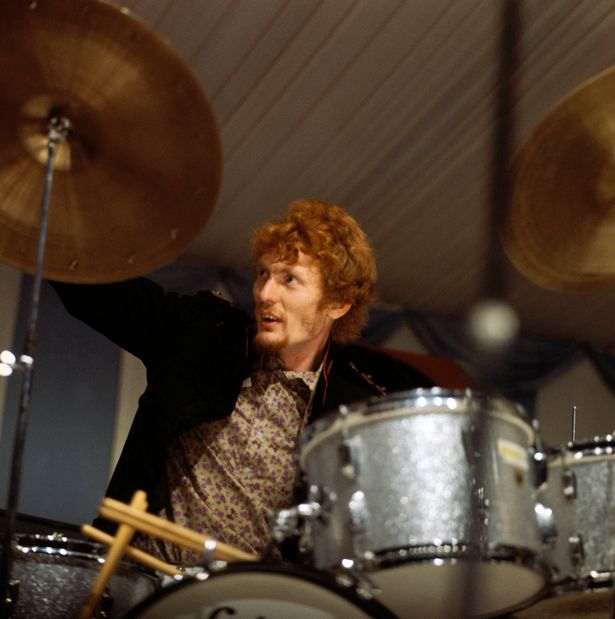A reflection in two parts.

Part One – A few individuals playing music in the 1960s would have a profound effect on the 1970s and on, even if they weren’t actively driving it in that latter decade. Ginger Baker was still playing, but he’d not have the same depth of respect or command as he did with Jack Bruce and Eric Clapton in The Cream (later just Cream).
Baker recoiled at the thought of himself being a rock drummer, instead viewing his work as that of a jazz player who could swing, could flip the beat and play in tandem with the other musicians. It was likely a statement about control. Few rock drummers are seen as the influencers of the sound. They’re the rhythm section, they only hold things down, they keep the time but don’t possess the spotlight, not like the singer or the guitarist. They’re the human metronome, which I think is the aspect Baker truly had disdain for. He saw himself as more than that and was repulsed when others did not feel the same way.
But he was influential. Think of early 1960s rock, particularly in the drum section. There wasn’t a lot of personality happening. A lot of tapping, a lot of drum rolls, and not much spontaneity. The sound was thin, not forceful. It was The Who’s Keith Moon who brought danger and recklessness to the scene, but it was Baker’s domineering thwack that had the greatest gravitational pull on music, particularly in heavy metal and the 1970s. Black Sabbath’s Bill Ward had that jazzy swing in his beats too and I presume Baker had an influence on him, but I also suspect Baker would cringe at the comparison. He repeatedly said he hated heavy music. If I was lucky, all he would have done was cringe.
Ginger Baker leaves behind a large body of work, a few examples of which have withstood time’s trials and will remain a constant within the world of classic rock.


Part Two – You’re going to read a lot about Ginger Baker this week, and most of it will be unflattering, and further still, he wouldn’t have cared what you thought of him. Along with tremendous talent came some of his less endearing characteristics. He was unambiguous about his drumming peers, about rock music, and at times about the human race. He thought very little of Moon and Led Zeppelin’s John Bonham, taking it a step beyond feeling their technique lacked refinement. Reports say he liked Charlie Watts as a person, but hadn’t the same charity for the rest of the Rolling Stones…and still he didn’t like Watts’ playing.
Baker was a longtime heroin addict. When he finally broke from the addiction in 1981, it had done terrible damage to him. He’s quoted, “God is punishing me for my past wickedness…by keeping me alive and in as much pain as he can…”
He will be remembered, it is safe to say, in this half-hearted light where supreme talent met extreme misanthropy. His own son Kofi said, “My dad is such an asshole that it’s not like I was stressed about making him proud of anything…”
The articles you read will state how, upon hearing his old bandmate Clapton was building a new band with Traffic’s Steve Winwood, Baker forced his way into the band, creating an atmosphere so toxic, it assured they’d be a single-album entity. This was, of course, Blind Faith. You might also read about how he contributed the gravel shaker sound to an initial run-through Paul McCartney’s “Mamunia” from Band on the Run, but probably not. Legend has it those tapes, recorded in Lagos, were stolen from McCartney under threat of violence by someone from the region. They wanted money, but got instead the tapes which, McCartney suspected, got dumped in the trash somewhere.
What does all of this mean? Allow me to preach a bit. The work of our lives is not just the products we influence the creation of, that we drag into realization from the GANTT chart or marketing plan. It’s not just how we paint our house or shovel the snow off of the sidewalk. It’s not even how we made the sandwiches. The work of our lives is the work of our lives, the stories we will leave behind in conjunction with the deeds we’ve done.
Ginger Baker wouldn’t have cared what the world thought of him either way, because he seemingly didn’t care about that in life. His legacy was not something he gave much interest in, and maybe it is futile to worry about what people think of you after you are dead. But Ginger Baker was a rare talent who, apparently, really cared about what he did and how it was perceived. It bothered him that his work was measured against his contemporaries and not against the players he aspired to be like. Apparently, it bothered him enough so that he mostly cast it all off, and he holed himself up in his South African compound and was unafraid of firing off a couple of gunshots if intruders (well-meaning or otherwise) dared to commence.
Fans are concerned about the personal lives of their music heroes, and unnecessarily so. It really does not matter if all the Beatles were still buddies just before John Lennon’s murder, but we want it to be so. We don’t like thinking that Steven Tyler and Joe Perry have a work relationship versus a familial one. And we don’t like thinking a musician we respect is also someone we’d hate to meet in real life because their personalities are so vitriolic.
I suppose it bothers me unnecessarily that such a gifted person’s memory will always compete with the tales of his unlikeability, straight up bullying, and general nastiness. His legacy will be an intermingling of being both a genius and a jerk, making all attempts at respect for the dead complicated, if not impossible. Others have gone to their reward while leaving behind agendas of cruelty, unresolved anger, greed and selfishness. None of us are saints, and some of us make it harder on our survivors to Spackle together the best version of us once we go. I suppose I’ll never know why that must be.